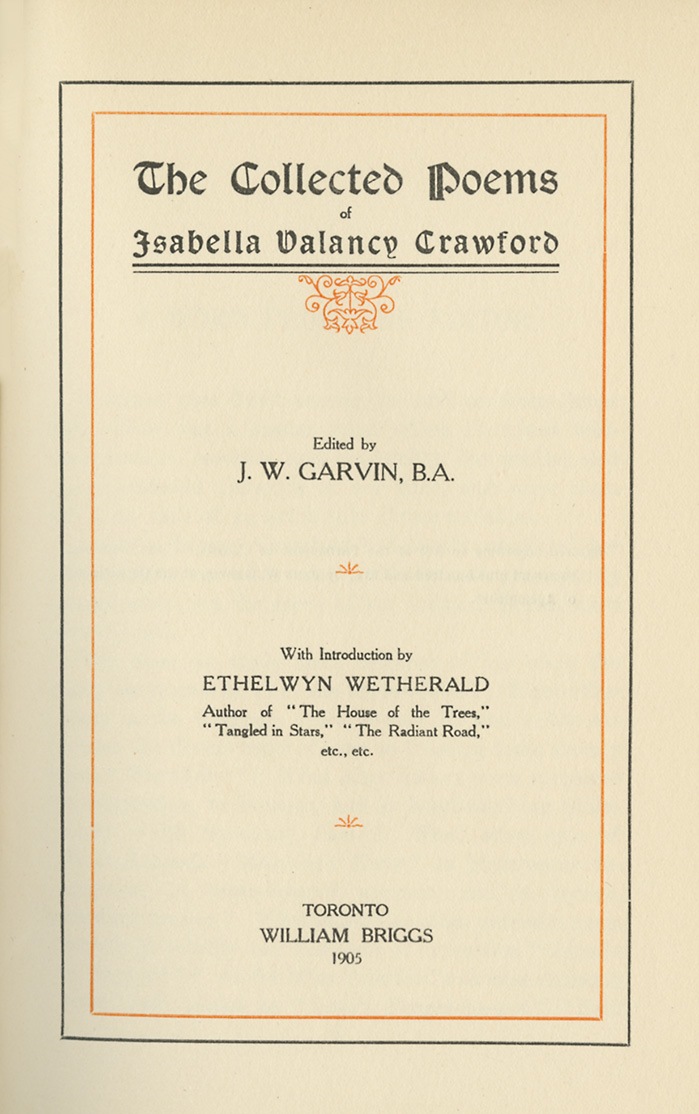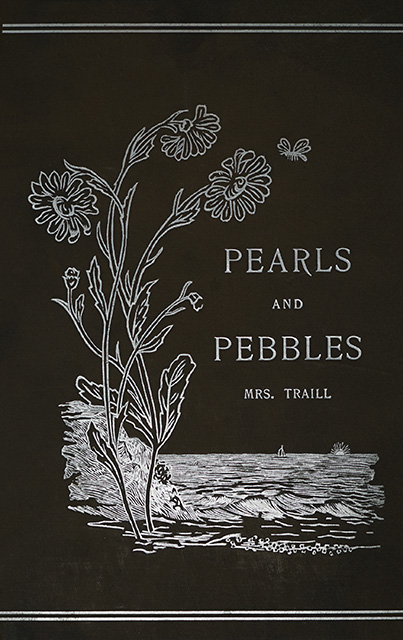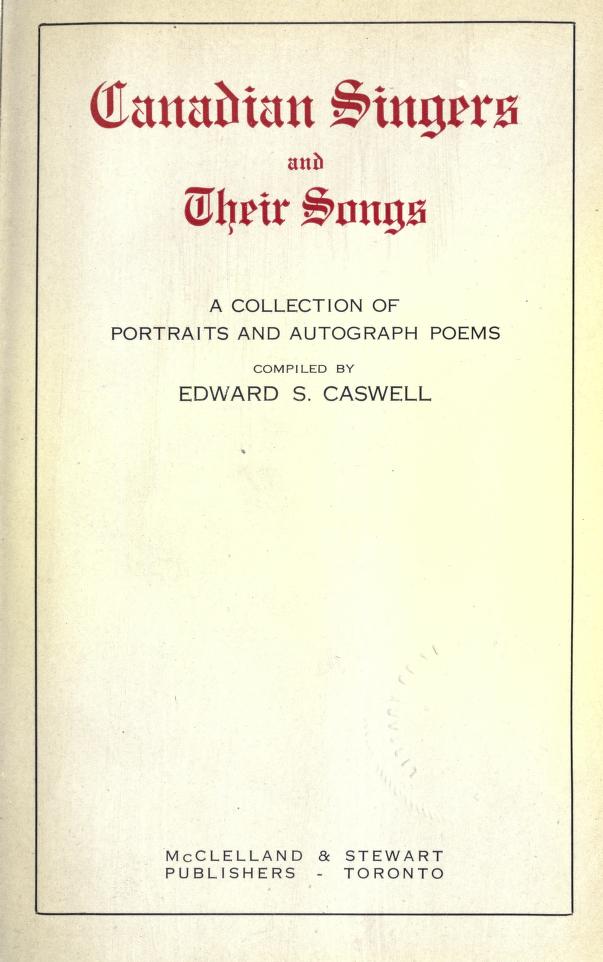As manager of the book publishing department of the Methodist Book and Publishing House for almost two decades, Edward S. Caswell (1861-1938) played a significant role as an editor and promoter of Canadian-authored books. When he resigned his position in 1909 to become Assistant Librarian at the Toronto Public Library, Saturday Night claimed he “had no little share in making the institution over which Dr. Briggs presides [as Book Steward] a great publishing house.”1 Canadian Bookman, for its part, assessed: Mr. Caswell “has had personal charge of the publication of many notable Canadian books, and in this way has made the acquaintance of a wide circle of authors, and has familiarized himself with Canadian literature, as few others have had the opportunity to do.”2 That circle of authors included the likes of Catharine Parr Traill, William Wilfred Campbell, Charles Mair, Ethelwyn Wetherald, Nellie McClung, and Agnes Laut.
Born in Goderich, Canada West (Ontario), Caswell was the son of a Methodist minister father and a mother descended from Quaker stock. His employment history included three years on staff at a local newspaper, the Lucknow Sentinel.3 He began work at the Methodist Book and Publishing House in 1881. Initially associated with the printing department, where he undertook compositional and proofreading work, it is quite likely he went on to spend time in the periodicals department. There, he would have had a chance to develop manuscript-reading skills under the eye of W.H. Withrow.4 By 1892, he was put in charge of the book publishing department.
Caswell’s surviving correspondence with authors as well as a handful of signed published articles identify him firmly as having been a keen advocate of Canadian-authored books. An inherent inclination in that direction was likely encouraged by Withrow and another minister then associated with the Methodists’ printing, publishing and bookselling operation: the Reverend E.H. Dewart. Dewart served as editor of the Christian Guardian from 1869 to 1894, but he is most remembered today for editing Selections from Canadian Poets (1864), an anthology motivated by his wish to preserve some worthy examples of Canadian poetry and bring them to the attention of his fellow countrymen.

Caswell himself would publish two brief pieces in the years immediately after his departure for the Toronto Public Library. In the first, “Canadian Literature,” he acknowledged that making a “few observations on the subject of Canadian literature … may provoke a cynical smile from any of the high apostles of Literature (always with the capital L),” and then proceeded to discuss its development in a manner quite consistent with contemporary advocates of his day. However, he did stand out for highlighting the particular roles of booksellers and publishers and asserted that an expansion of Canadian literature occurred in the 1890s through a combination of population growth and “development of a national spirit.”5 Another article by Caswell, “Time on Our Side,” directly responded to an earlier piece by critic J.D. Logan entitled “A Decade of Canadian Poetry.” In assessing Logan’s take on Canadian poetry, Caswell questioned the absence of poets like Alexander McLachlan and Isabella Valancy Crawford from the discussion and disputed Logan’s dismissal of Robert W. Service’s work as vulgar and abominable.6 The Poetical Works of Alexander McLachlan (1900), The Collected Poems of Isabella Valancy Crawford (1905), and Service’s Songs of a Sourdough (1907) had all appeared under the Briggs imprint while Caswell was manager of the book publishing department.
Caswell’s surviving correspondence provides the best insight into the work he did as manager of the book publishing department. We know from such correspondence that he read manuscripts and provided editorial feedback to authors, that he ghost-wrote some of the letters officially signed by Briggs, that he sought publicity for published titles, and that he collected reviews. He also collaborated with another manager – S.B. Gundy, the head of the wholesale department who regularly travelled to the UK and US – to try to acquire foreign co-publication arrangements for certain titles. By the end of the nineteenth century, Caswell had become such an integral part of the literary scene in English Canada that he proved an invaluable ally to Theodore H. Rand as he compiled A Treasury of Canadian Verse (1900), one of the firm’s rare works to gain US and UK co-publishers. In the work’s preface, Rand acknowledged Caswell “for many courtesies, and specially for aid in procuring well-nigh inaccessible materials for examination.”7
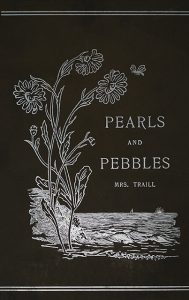
Caswell also worked with Catharine Parr Traill in the final years of her life to publish Pearls and Pebbles (1894) and Cot and Cradle Stories (1895). His correspondence with Traill provides insight into Caswell as an editor. While he could be quite firm about the need for revision, he also had a capacity to be playful. For example, when reading the manuscript for Cot and Cradle Stories, he expressed pleasure in “the wrens of Westove & their visit south, the tribulations of Mrs. Partlett & Mrs. Dorking; the … admonitory utterances of Mrs. Poll Parrot and the phoebes of Minnewawa,” and then stated he was made “a child again” by reading about them.8 That he felt much enthusiasm for his work as manager of the book publishing department also found voice in a letter to Traill in 1897: “As time goes on my work here seems to grow more engrossing,” he wrote. “I seem to live in it and for it – as well as by it. The increasing number of our publications brings increasing duties, and it ties me up pretty closely, body & brain.”9
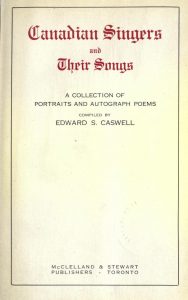
During his years in Toronto, Caswell also enjoyed a rich life as a volunteer. He founded the Broadway Literary and Debating Club (est. 1896), stood as a founding member of the Canadian Club (est. 1897), served as an historian with the York Pioneer and Historical Society, and played an energetic role as a lay member of the Methodist Church. Indeed, by 1920, he was a member of the Book Committee of the Methodist Book and Publishing House. In addition to his occasional journalism, his personal literary work included compiling three editions of a gift book of autograph poems, Canadian Singers and Their Songs (Briggs: 1902; McClelland & Stewart: 1919; 1925), and editing the first Canadian edition of Catharine Parr Traill’s The Backwoods of Canada for Toronto publisher McClelland & Stewart (1929). He also engaged in a publishing partnership with Willet Haight, which, during the first decade of the twentieth century, re-issued at least three historically significant Canadian works under the imprint of the Historical Publishing Company.10 By the time of his death in January 1938, Edward S. Caswell had made significant contributions to Toronto’s literary, historical and Methodist communities, and to the broader milieu of Canadian letters.
1 Saturday Night 23 October 1909: 7.
2 “Toronto’s New Assistant Librarian,” Canadian Bookman October 1909: 169.
3 Michael A. Peterman and Janet B. Friskney, “‘Booming’ the Canuck Book: Edward Caswell and the Promotion of Canadian Writing,” Journal of Canadian Studies 30.3 (Autumn 1995): 61.
4 Peterman and Friskney 62.
5 Edward S. Caswell, “Canadian Literature,” Christian Guardian 24 November 1909: 8.
6 Edward S. Caswell, “Time on Our Side,” Canadian Magazine April 1913: 581-82.
7 Theodore H. Rand, A Treasury of Canadian Verse (Toronto: William Briggs; London: J.M. Dent, 1900) xii.
8 Caswell quoted in letter to Traill, cited in Peterman and Friskney 69.
9 Caswell quoted in letter to Traill, cited in Janet B. Friskney, “Beyond the Shadow of William Briggs, Part I: Setting the Stage and Introducing the Players,” Papers of the Bibliographical Society of Canada 33.2 (Fall 1995): 146.
10 The books were John Richardson’s The War of 1812 (1902 reissue) and Wacousta (1906 reissue), and William “Tiger” Dunlop’s Recollections of the War of 1812 (1908 reissue).





